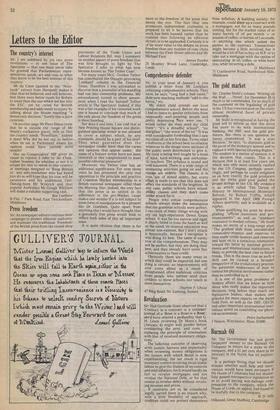Press freedom
Sir: As newspaper editors continue their campaign to protect editorial authority and maintain the traditional 'Freedom' of the British press from the closed shop provisions of the Trade Union and Labour Relations Bill, may I comment on another aspect of press freedom that was first brought to light by The Spectator. I refer to what has now become known as 'The Tether Case'.
For many years Mr C. Gordon Tether has contributed the thought-provoking 'Lombard' column in the Financial Times. Therefore I was astonished to discover that a journalist of his standing had run into censorship problems. My astonishment turned to sheer amazement when I read the 'banned' Tether article in The Spectator. Indeed, if this was a fair example of his censored work one is bound to conclude that much of the talk about the freedom of the press is sheer humbug.
Nor does it end here. I am told that at New Printing House Square one distinguished specialist writer is not allowed to cover a subject which, by any standards, should be a part of his brief. Then what guarantee does the newspaper reader have that the views and opinions that appear under the name of a feature writer have not been censored or else compromised to meet possible editorial pressures?
Moreover, the Tether case has an additional significance. For over three years he has presented the only real opposition to the principle and practice of Common Market membership in a British national newspaper other than the Morning Star. Indeed, the very fact that the press is so united in its adherence to the pro-Market cause makes one wonder if it is not subject to some form of manipulation by a present day Dr Goebbels. Quite apart from anything else I would have thought that a genuinely free press would wish to reflect both sides of this all important issue.
It is quite obvious that there is far more to the .freedom of the press that meets the eye. The fact that one prominent independent journalist is prepared to let it be known that his work has been banned, rather than be coerced into following an editorial dictate, is to be applauded. Certainly it is of far more value to the debate on press freedom than any number of cosy chats between the Fleet Street editors and Mr Michael Foot.
James Towler 25 Moseley Wood Lane, Cookridge, Leeds


































 Previous page
Previous page